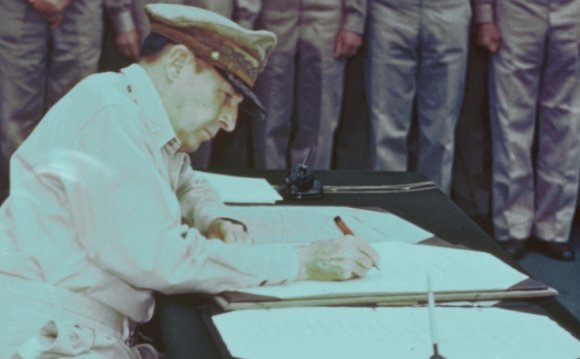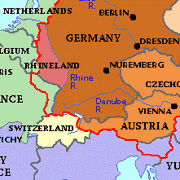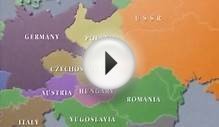
 World War II commenced as a localized conflict in eastern Europe and expanded until it merged with a confrontation in the Far East to form a global war of immense proportions. The war began in Europe on Sept. 1, 1939, when Germany attacked Poland, and ended on Sept. 2, 1945, with the formal surrender of Japan aboard the U.S. battleship Missouri in Tokyo Bay. Involving most of the world's major powers as belligerents, it also included many smaller states on both sides and had a great impact on neutral nations. The victorious Allies included the United Kingdom and the Commonwealth of Nations, France, the United States, the Union of Soviet Socialist Republics, and China. The losing side comprised Germany, Italy, and Japan, as well as smaller nations. The opponents clashed in two major areas: Europe, including the coast of North Africa and the North Atlantic; and Asia, including the Central and Southwest Pacific, China, Burma, and Japan. The belligerents fought over the central issue of Axis expansion, which was halted at the cost of many millions of military and civilian casualties.
World War II commenced as a localized conflict in eastern Europe and expanded until it merged with a confrontation in the Far East to form a global war of immense proportions. The war began in Europe on Sept. 1, 1939, when Germany attacked Poland, and ended on Sept. 2, 1945, with the formal surrender of Japan aboard the U.S. battleship Missouri in Tokyo Bay. Involving most of the world's major powers as belligerents, it also included many smaller states on both sides and had a great impact on neutral nations. The victorious Allies included the United Kingdom and the Commonwealth of Nations, France, the United States, the Union of Soviet Socialist Republics, and China. The losing side comprised Germany, Italy, and Japan, as well as smaller nations. The opponents clashed in two major areas: Europe, including the coast of North Africa and the North Atlantic; and Asia, including the Central and Southwest Pacific, China, Burma, and Japan. The belligerents fought over the central issue of Axis expansion, which was halted at the cost of many millions of military and civilian casualties.
Background to War
After the horrors of World War I, the 1920s seemed to augur a long era of international stability, liberal constitutionalism, and economic prosperity, but serious diplomatic, political, and economic problems remained unsolved. The Great Depression of the 1930s brought these problems to the fore and helped create an environment in which militaristic authoritarianism flourished.
The 1920s
International agreements reached during the 1920s appeared to portend future peace. The Washington Conference (1921–22) fixed the ratio of capital ships among the powers and declared open and equal access to China. The Locarno Pact (1925) and the Kellogg-Briand Pact (1928) presented the prospect of arbitration as an alternative to force in Europe. Meanwhile, the League of Nations, which had been established in 1919, provided procedures designed to isolate any would-be aggressor and to promote disarmament. The United States did not join the League.
Despite the portents for peace, Italy, Germany, and Japan were dissatisfied nations in which dangerous tendencies toward bellicose nationalism threatened constitutional government and world order.
In Italy, which had obtained little for its efforts on the victorious side in World War I, internal disorder combined with diplomatic frustration to overturn (1922) the fragile, shallow-rooted parliamentary system in favor of the Fascist movement of Benito Mussolini. Harboring territorial ambitions, Mussolini established a corporate state founded on chauvinistic nationalism.
The harsh terms imposed on Germany at the end of World War I by the Versailles Treaty were deeply resented in that nation. The democratic Weimar Republic, as a product of German defeat, bore the onus of association with the treaty. Antidemocratic and violently nationalistic right-wing organizations — and even private armies, such as the virulently anti-Semitic storm troopers of Adolf Hitler — flourished immediately after the war.
Like Italy, Japan had been on the winning side in World War I. Many Japanese were also dissatisfied with their country's international status, believing that Japan should be the dominant power in East Asia. This view was particularly common among military officers participating in a revival of nationalism incorporating Shinto, emperor worship, and glorification of warrior virtues. Although Japan had a liberal, pro-Western government during the 1920s, the military remained influential. From about 1927, nationalistic military officers began appearing in cabinet posts and pressing for a more aggressive China policy.
Depression and Frustration
Optimism thrived during the prosperity of the 1920s, but it was a prosperity flawed by, among other things, overextension of credit and inadequate worker purchasing power. When economic well-being gave way to depression in 1929, the shock discredited constitutional government in those nations lacking a strong liberal tradition and already bedeviled by frustrated nationalists. Leaders complained in Germany, Italy, and Japan that their nations did not have fair access to raw materials, markets, and capital investment areas, all of which were necessary for their economic health. They argued that their nations were the victims of economic warfare — with its protective tariffs, managed currencies, and cutthroat competition — and that they had been left behind in the race for economic self-sufficiency and a favorable balance of trade. They made it plain that they would fight, if necessary, for a better economic status.
Because they felt that democracy had failed, the people of those countries looked with increasing favor on antidemocratic elements that glorified war as the means of national salvation. In Italy, Mussolini's cries that Italians needed both colonies and glory struck a responsive chord. In Germany, Hitler's National Socialists gained power in 1933. Meanwhile, Japanese militarists won a preponderant influence in the inner circle of their government.
RELATED VIDEO












